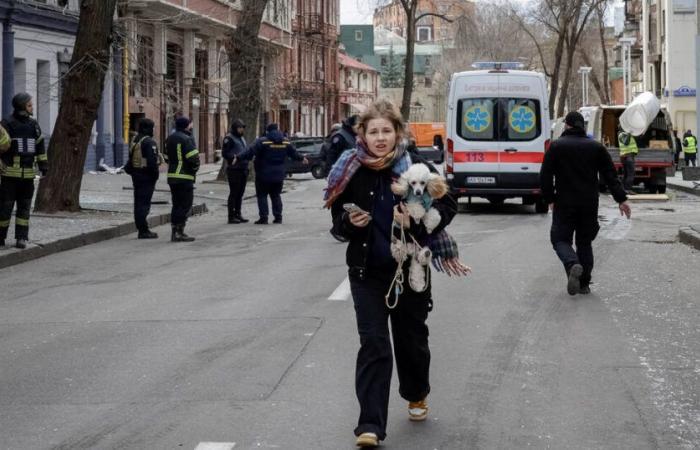
This Monday, Libé selects the most important news regarding the war between Russia and Ukraine.
British man fighting for Ukraine captured by Russia
The United Kingdom will provide “all the support possible” to a Briton captured by Russian forces while fighting for Ukraine, British Foreign Secretary David Lammy said on Monday. The minister indicated that he had been informed “these last few days” of the detention of this Briton. “We will do everything in our power to provide this British national with all possible support,” said the minister on the sidelines of a G7 meeting near Rome. A video released this weekend by pro-Kremlin groups shows a captured foreign fighter with his hands tied and identifying himself as James Anderson. He explains that he joined the Ukrainian forces after being discharged from the British army. He was reportedly captured in the Kursk region of Russia.
British sanctions against Russian oil and gas ‘ghost fleet’
The British government announced this Monday sanctions against 30 additional ships from the “ghost fleet” allowing Russia to export its oil and gas by circumventing Western restrictions imposed since the invasion of Ukraine. British sanctions now target 73 ships, indicates the Foreign Office, stressing that the United States has sanctioned 39 and the European Union 19.
“This morning I am announcing the largest package of sanctions against the Russian ghost fleet. This underlines the UK’s commitment to Ukraine. British Foreign Secretary David Lammy said during a meeting with his G7 counterparts near Rome. Made up of around 600 ships, this fleet transports nearly 1.7 million barrels of oil per day, London estimated in July.
New exchanges of drone and missile strikes
Russia and Ukraine each launched drone and missile strikes on Monday, amid escalating tensions due to Vladimir Putin’s threats against the West and the use of a latest generation Russian ballistic weapon on Ukrainian territory. Moscow claimed today to have shot down eight missiles coming from Ukraine, as well as American-made aerial bombs. “Air defense downed eight ballistic missiles, six US-made JDAM guided aerial bombs, as well as 45 drones,” indicated the Russian Ministry of Defense, which provided no details on the type of missiles or the targeted targets. But last week, Russia struck Ukraine with the Orechnik, a latest generation intermediate-range ballistic missile (up to 5,500 km), without nuclear warhead, and promised to increase this type of attacks if Kyiv continued to use Western missiles against Russian territory.
Ukraine says it hit Russian fuel depot
Ukrainian kamikaze drones struck a fuel depot in the Russian region of Kaluga during the night from Sunday to Monday, a source within Ukrainian military intelligence said on Monday. “The target of the attack was the oil depot” du groupe Nefteprodukt, “who is involved in supporting Russia’s armed aggression against Ukraine”, said this source within military intelligence, affirming that the strike had caused “destruction” important. The Russian governor of this region located south of Moscow indicated that air defense had shot down eight drones in the suburbs of Kaluga. There “falling debris” of these devices caused a fire in a “industrial enterprise”, which took several hours to be extinguished, declared the governor, Vladislav Chapchan, without giving further details.
The United Nations denounces the “renewed threat” of antipersonnel mines
The Secretary General of the United Nations denounced this Monday the “renewed threat” anti-personnel mines, days after the United States said it would provide the weapons to Ukrainian forces fighting the Russian invasion. While António Guterres praised the work of mine clearance and destruction around the world, he warned that “the threat persists”. In particular due to the fact “the resumption of the use of anti-personnel mines by certain parties to the Convention, as well as the delay taken by certain parties in their commitments to destroy these weapons“. The secretary general called on the 164 signatories – which include Ukraine, but not Russia and the United States – to “fulfill their obligations and ensure compliance with the Convention”.





